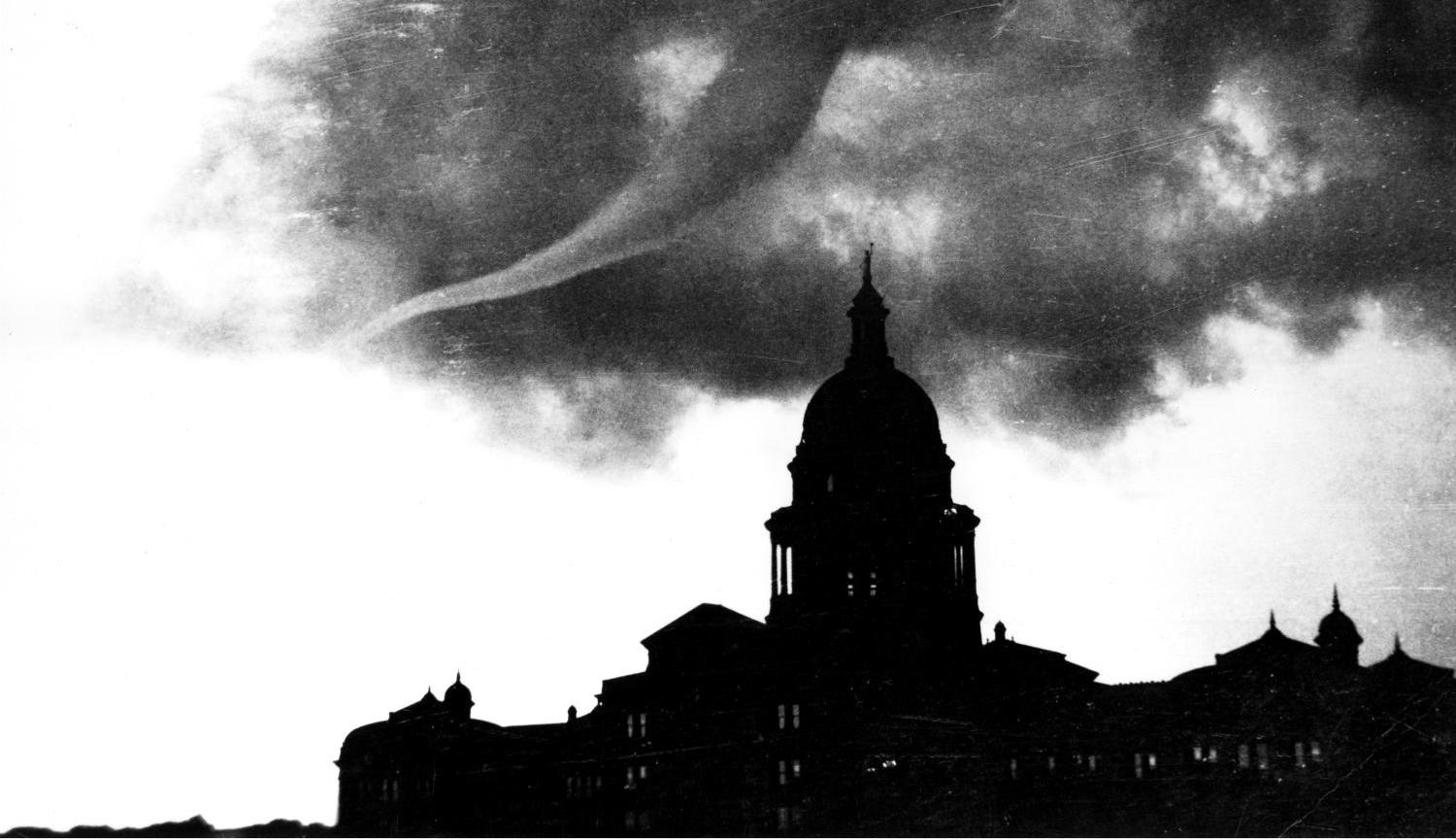ustxtxb_obs_1963_07_26_50_00009-00000_000.pdf
Page 7
“Yes, sir.” “You want a job this summer?” “Yes, sir.” “This is Mr. Ferguson, dean of Stephen F. Austin State Teachers College in Nacogdoches. He’s taking his doctor’s tomorrow. Meet him after the ceremony and he’ll tell you how to get to Nacogdoches and when to be there.” This was all. The next afternoon I was on board a train for Jacksonville, where I had to change to a bus in order to reach Nacogdoches. Of course I was very grateful to Webb at the time. When I reminded him of this incident years later and expressed my gratitude again, he said, “Wilson, you shouldn’t be grateful to me.” I was puzzled, but after the appearance of the story of how William E. Hinds had helped him obtain an education I understood. In the fall of 1930 I began teaching at Rice and continued there until 1937. During these years I saw Webb on occasional visits to Austin, and I bought and read The Great Plains and Divided We Stand when they appeared, in 1931 and 1937. Through his books he has continued to be my teacher down to the present day. The publication of Divided We Stand came just at the time when I had become a traveler for a publisher whose home office was in Massachusetts. In this book Webb stated that if everyone in the South and West who was working for a Northern firm were in uniform the South and West would look like any army camp. The book made me acutely conscious that the more successful I was in obtaining orders in my territory the more I was contributing to the economic dominance of the North. Not long after the appearance of Divided We Stand Webb made a talk at the Cokesbury Book Store in Dallas which I was able to hear by accident of being in Dallas at the same time. He told a story to illustrate how he felt when he sold Hollywood the movie rights to The Texas Rangers. A Texas cowman was riding a Pullman to Kansas City for the first timehe had always ridden up with his cattle on a freight and back on the chair car. He knew he was to tip the porter but he didn’t know how much. “George, how much am I supposed to tip you when I get off at Kansas City?” he asked. “Just whatever you think right, suh.” “How much do they usually tip you?” “It ranges. Some tips one way and others another.” “Well, George, what would you say your average tip is?” “A dolluh, suh.” When the porter brushed him off as they were pulling in, the cowman gave him a silver dollar. With a big smile George said, “Thank you, suh! That’s the first time I ever made my average.” The fee for the movie rights gave Webb a start toward a fortune. With it he bought an old church bordering the capitol grounds, rented the building to the state Mr years, and eventually sold it to the state for a good profit. He made other investments in Austin. Webb was a fine businessman as well as a fine scholar. He loved a good story, though he was not given to joking in the classrooms. Once I heard him tell a story which he later used, in a revised form, for the conclusion of “How the Republican Party Lost Its Future,” which appeared in 1949. ‘A certain man kept telling himself about the great things that he would do in the future, but he never got down to work. One morning while shaving he was struck by the lines in his face and the thinness and greyness of his hair. After a long look he exclaimed, “My God, my future is now my past!” This story is capable of producing a bad case of the midnight shakes even of extracting work from ex-fairhaired boys. Webb liked folk sayings, though he did not use many himself. One day while he, Mody Boatright, and I were having coffee together, he suddenly asked, “Mody, what was that about the cat?” Mody’s reply, “‘I’ll do it if it hairlips all the cats in Grimes County’,” brought a burst of hearty laughter. The laughter of Webb and his good friends Dobie and Bedichek was marvelous to hear. It rang out on the picnics we used to have. It might not keep a man from committing suicide, but it would make him laugh before pulling the trigger. Webb, Dobie, and Bedi were accustomed to thinking about and discussing the world’s most serious problems, but they had a playfulness of mind on appropriate occasions that indicated freedom and flexibility. In this respect they were like Erasmus and Sir Thomas More. To be deeply concerned for the welfare of mankind in perilous times and yet to be able to laugh at the right moment, not to lose the joyousness of lifethis is a great gift that perhaps can be cultivated. AFTER World War II and four years in the Air Force I had returned to Texas to teach in the university. I just missed the time of troubles set off by the Rainey affair, in which Webb played a courageous part representing the faculty. One day at coffee Webb told me about his experience at the University of Chicago, where I had taken my last degree. At his oral examination he “froze” when the first question was asked, nor could he say anything in response to the second question. He turned on his heel and walked out. “My mind was racing. I went straight to the apartment and told my wife to pack. We got out of Chicago before sundown.” Webb was always kind to nervous doctoral candidates at their orals; he found the right questions to get them started and give them a chance to show their knowledge. Eugene Barker, recognizing _ that Webb was an original and independent thinker who had to make his own way, had asked for two copies of The Great Plains, which he accepted as Webb’s dissertation, and granted him a degree. Webb was a learned man with a capacity for hard thinking and sustained effort, but he was not academic. He did not immure himself in the university or cut himself off from the outside world. He wanted to communicate with the general reader and he succeeded admirably in doing so. Once at a meeting of the university faculty he alluded to “professors who write little articles for their colleagues to read.” His unemphatic tone gave no clue to the scorn he felt. In an essay solicited but rejected by the editor of American Heritage because it was too strong, he charged that academic training produces timid and self-repressed historians who write in a colorless way on the assumption that they are being objective. “In graduate schools the student is taught to select a subject of such small dimensions that it offers no challenge to the intellect, does not develop the mind, and has little or no significance when developed. He is encouraged to write without benefit of imagination, to avoid any statement based on perception and insight unless he can prove by the documents that his idea is not original.” “An Honest Preface” is a brilliant satire on the academic game of writing a little book to get a little promotion ; the central idea of the professor’s book is “an entirely new theory as to the relationship existing between the physical law governing the refraction of light and the incidence of the high cost of living on tenant farmers among the Esquimaux.” Webb had intellectual daring. Without this quality he would not have attempted the grand synthesis of modern history represented in The Great Frontier. Once while -he was on leave to work on this book I met him on the campus as he was walking along with his slow, swinging stride, looking at the ground and putting a cigarette to his mouth. I had to call his name twice before. he noticed me. Over coffee I asked him what he was working on. After telling me he said, “This is the biggest thing I’ve tackled yet, but I think I can handle it.” And handle it he did. About a year later I happened into his office at the moment when he was putting the manuscript into a box to send to his publisher. “I wonder how they’ll take this,” he said when the package was wrapped and addressed. He did not mean the publishers but the historians and critics who would read the book. At such a time a writer almost always experiences a moment of self-doubt. “Well,” he said, lighting a cigarette, “if all you write is what everybody agrees with, you haven’t said much. Let’s mail this and get a cup of coffee.” Some months after the book was published I asked him what the reviewers were saying. “They say it isn’t Toynbee.” And he laughed with amusement. N HIS CHOICE of subjects Webb showed courage and a high regard for the public good. He was not afraid to deal with “controversial” subjectsa word now beloved by radical rightists and moral cowards. In the manuscript of Divided We Stand, in which he attacked the economic dominance of the North, there was a chapter on the ruination of a small independent bottle factory at Santa Anna, Texas, by the monopolistic Hartford Empire Glass Company. The publishers removed the chapter, but Webb restored it July 26, 1963 9


